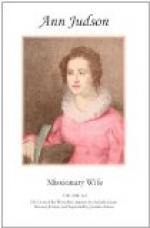“Such a stimulus was afforded, when after two years of painful suspense, during which it was not known whether the missionaries were dead or alive, the touching recital of their unparalleled sufferings for Christ’s sake, and of their wonderful deliverance, at length burst like an electric shock upon the American churches. And that shock has not yet spent its force, as we have recently seen in the effect produced by the simple, silent presence, in the assemblies of the saints, of the venerated man of God, who can say with an Apostle—’I bear in my body the scars of the Lord Jesus!’"[4]
That worn veteran had but to arise in a Christian assembly, and a thrill of sympathy was sent through the audience, and thousands upon thousands of dollars were pledged on the spot to that cause which his silent presence so powerfully advocated.
Another consequence of the war, was to secure British toleration and protection to a large territory, hitherto almost inaccessible to the missionaries. Of this we shall speak more fully hereafter.
Mrs. Judson proceeds: “We should have had no hesitation about remaining at Ava, if no part of the Burman empire had been ceded to the British. But as it was, we felt that it would be unnecessary exposure, besides the missionary field being more limited in consequence of intoleration. We now consider our future missionary prospects as bright indeed, and our only anxiety is to be once more in that situation when our time will be exclusively devoted to the instruction of the heathen.
... “This letter, dreadful as are the scenes herein described, gives you but a faint idea of the awful reality. The anguish, the agony of mind, resulting from a thousand little circumstances impossible to delineate on paper, can be known by those only who have been in similar situations. Pray for us, my dear brother and sister, that these heavy afflictions may not be in vain, but may be blessed to our spiritual good, and the advancement of Christ’s Church among the heathen.”
* * * * *
The following is extracted from a tribute to Mrs. Judson which appeared in a Calcutta paper, after the war. It was written by a fellow-prisoner of Mr. J.
“Mrs. Judson was the author of those eloquent and forcible appeals to the government, which prepared them by degrees for submission to terms of peace, never expected by any who knew the haughtiness and inflexible pride of the Burman court.
“And while on this subject, the overflowings of grateful feelings on behalf of myself and fellow-prisoners, compel me to add a tribute of public thanks to that amiable and humane female, who, though living at a distance of two miles from our prison, without any means of conveyance, and very feeble in health, forgot her own comfort and infirmity, and almost every day visited us, sought out and administered to our wants, and contributed in every way to alleviate our misery.




